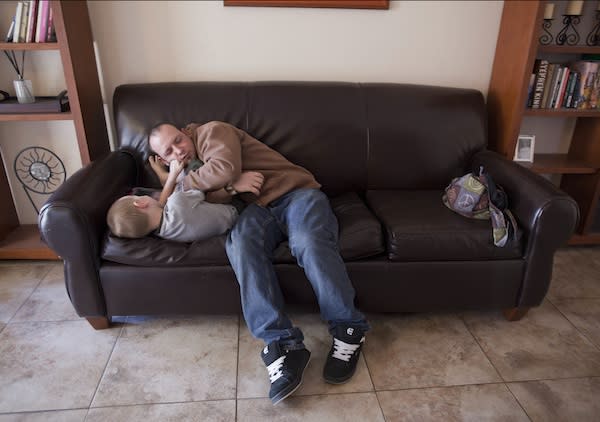 The Lookout
The LookoutNew study charts psychological toll of long-term joblessness

Increasingly, America's unemployment crisis is becoming a matter of duration. Jobs are being created again, and layoffs are much rarer these days than they were during the nadir of the Great Recession. But for those without work, things aren't getting much better. The average spell of joblessness now lasts around nine months, and the longer a person is out work, the less likely he is to find it--a state of affairs that's not helped by the apparent recent uptick in discrimination against the jobless. In sum, we're moving towards the creation of a semi-permanent class of perpetually unemployed Americans.
That's why it's worth paying more attention to the effects of long-term unemployment. It's hardly surprising that not having a job can make people discouraged and depressed. But a new study [pdf] provides some empirical support for that notion--even documenting that people start sleeping in later the longer they've been without a job. And it suggests that the psychological effects of joblessness may make it even harder to find work. Call it the vicious cycle of long-term unemployment.
The study, conducted for the Brookings Institution by Alan Krueger of Princeton University and Andreas Mueller of Stockholm University, surveyed more than 6,000 unemployed workers, interviewing them every week for up to 24 weeks in late 2009 and early 2010. Among its findings:
• The amount of time that a worker spends looking for a job decreases "sharply" the longer he's unemployed, an effect the report's authors call "noteworthy." In one model, the report found that over a 12-week period, the amount of time the average person spent looking for work fell by half an hour.
• People are no more likely to find a job, or even to spend more time looking, around the time when their unemployment benefits are set to expire. That finding appears to weaken the argument--advanced lately by some in Congress--that extending jobless benefits will discourage people from looking from work.
• Unemployed people "express much dissatisfaction and unhappiness with their lives," and are particularly unhappy while looking for a job. Not surprisingly, this unhappiness only increases the longer the search is unsuccessful. And as anyone who's ever been without a job can attest, the only activity that increases over the course of joblessness is sleep."Even more precisely," the authors archly note, "sleep in the morning hours tends to rise."
The findings jibe with other research which suggests that the jobless commit suicide at two or three times the national average. As the Washington Independent reported last year, suicide rates in several counties with high levels of joblessness--such as Elkhart County, Ind., and Macomb County, Mich.--have spiked lately.
And of course, these psychological effects are in addition to the more practical effects of going without work for so long: As the Labor Department has said, the skills of the long-term unemployed begin to erode, and they become less marketable.
Still, the study comes at a time when, as New York Times columnist Paul Krugman notes today, the debate in Washington appears to have moved on from the plight of the unemployed. Congressional leaders have made clear that cutting spending is the priority -- even though most studies say it'll cost jobs. And President Obama's blueprint for the economy, laid out in January's State of the Union, focused on spurring long-term growth through investments in education and innovation, but had almost nothing to say to those who are currently out of work.
(John Clark, right, who has been unemployed for two years, plays with his son Logan Burban, 5, at their Las Vegas home, February 2011.: Julie Jacobson/AP)
